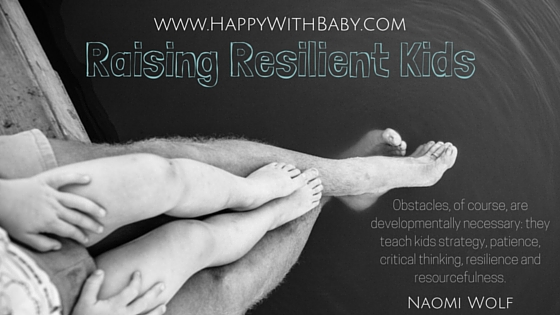Raising Resilient Kids

Doesn’t it seem like every time you log on to the internet, whether it be Facebook, Pinterest, Twitter, whatever…there is always something someone is telling you what you need to do with your children. There’s a technique for handling any situation. A research study supporting this or that philosophy.
And a recent one that I’ve encountered many times--and I’m sure you have too--is teaching resiliency to our kids.
“Shoot,” you think! “I’m just trying to raise happy, healthy, and well-adjusted kids. Now, resiliency is just one more thing to add to that list.”
What is resiliency? Dictionary.com defines it as “the power or ability to return to the original form, position, etc., after being bent, compressed, or stretched; elasticity” or "the ability to recover readily from illness, depression, adversity, or the like; buoyancy.”
I think of it as being able to handle different situations and circumstances, and being able to adjust.
Crap, that sounds like a huge undertaking, doesn’t it? Especially as I type this, I am quickly recalling my 6-year-old’s meltdown after falling and scraping his knee, and how the crying and at times screaming (at least it felt like screaming) seemed to go even as we cleaned it up.
That is a perfect example of how there is nothing you can do to have an always happy, always healthy, always well-adjusted child. They will have their moments, but there are never long-lasting guarantees.
They will cry. They will yell. They will be fearful. They will be angry.
BUT, they will also laugh.They will be silly. They will be loving.
They will encounter so many different emotions. It’s how they handle those emotions that will matter.
How, as their parent, are you helping them handle these emotions?
Do you let them have those feels? Those sometimes seemingly irrational feelings about the monster that hides under their bed? Do you tell them, “Don’t be ridiculous. Of course, there are no monsters. Just go. To. Sleep. Already!!!”?
Or, what about the overly dramatic ones--the ones that drive you’re the craziest--about not getting the toy at the store? Do you yell back, screaming, “If you don’t stop you’ll never get another toy!!!”?
Or, instead, do you reassure them there are no monsters and look under their bed for the 10th time? Do you make sure to leave a night light on and give them their favorite teddy bear to hold, as you tell them you will be back to check on them in 15 minutes?
And, instead, do you tell them that they can’t have a toy from the store this time because their birthday is coming up? And do you tell them, “I know you’re disappointed. It’s OK to be sad, angry, disappointed, but today we can’t get something.”?
Do you validate them? Do you let them know it’s OK to feel what they’re feeling? Do you teach them that, while it’s OK to have their feelings, it’s what you do with those feelings that matter?
I would like to think I am always good about validating feelings and not reacting suddenly to the overwhelming display of emotions in the moment. But, I’m not. I mess up. More than I’d like to.
But, the important thing to remember here is that my child doesn’t need me to be perfect. Your child doesn’t need a perfect parent either.
So, I apologize when my emotions get the better of me. I model forgiveness. I explain to them how I’m feeling and we get through it together. And, in doing so, I don’t have to think about teaching them resilience.
Instead, I’m modeling resilience for them.
Subscribe
Sign up to get the latest weekly blogs sent straight to your inbox


0 comments
Leave a comment
Please log in or register to post a comment